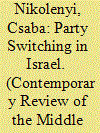| Srl | Item |
| 1 |
ID:
182574


|
|
|
|
|
| Summary/Abstract |
This study is to analyze how the fragmentation of the pro-democracy camp affected their council voting and policy stances before 2019. The quantitative measurements including the rice and unity indices are adopted to evaluate the cohesions of the pro-Beijing and pro-democracy camps in bill voting, in which the strategies employed by the pro-democracy camp are further analyzed. Before the 2010s, the moderate democrats deliberately separated from the administration and some of them also kept distance from the radical groups. However, since the radical ideologies gained supports from time to time, the moderate democrats had been forced to follow more pro-active lines against the administration. Although the political sphere of Hong Kong has drastically changed after the 2019 Anti-extradition Protests, the cohesion of the pro-democracy parties in the previous terms of the Legislative Council still facilitates to understand the legislative process in the city. In this article, 18 then members of the Legislative Council from different parties were interviewed in 2018, providing various insights on the analysis of pro-democracy cohesion and fragmented politics in Hong Kong.
|
|
|
|
|
|
|
|
|
|
|
|
|
|
|
|
| 2 |
ID:
169987


|
|
|
|
|
| Summary/Abstract |
In January 2011, former Israeli Prime Minister Ehud Barak issued a surprising announcement to take four other members of his Labor Party’s Knesset faction with himself to set up a new political party, Haatzmaut (Independence). The conditions under which this split took place illustrate the ways in which the Israeli anti-defection law, passed in the 12th Knesset, incentivizes the behavior of elected legislators who seek to exit from the party that they were elected to represent. This article shows that the anti-defection law cannot keep a legislative party together that suffers from weak internal cohesion. In fact, by imposing numerical criterion (1/3) on prospective party switchers, the anti-defection law prolongs internal disunity, thereby further weakening an already low level of cohesion.
|
|
|
|
|
|
|
|
|
|
|
|
|
|
|
|